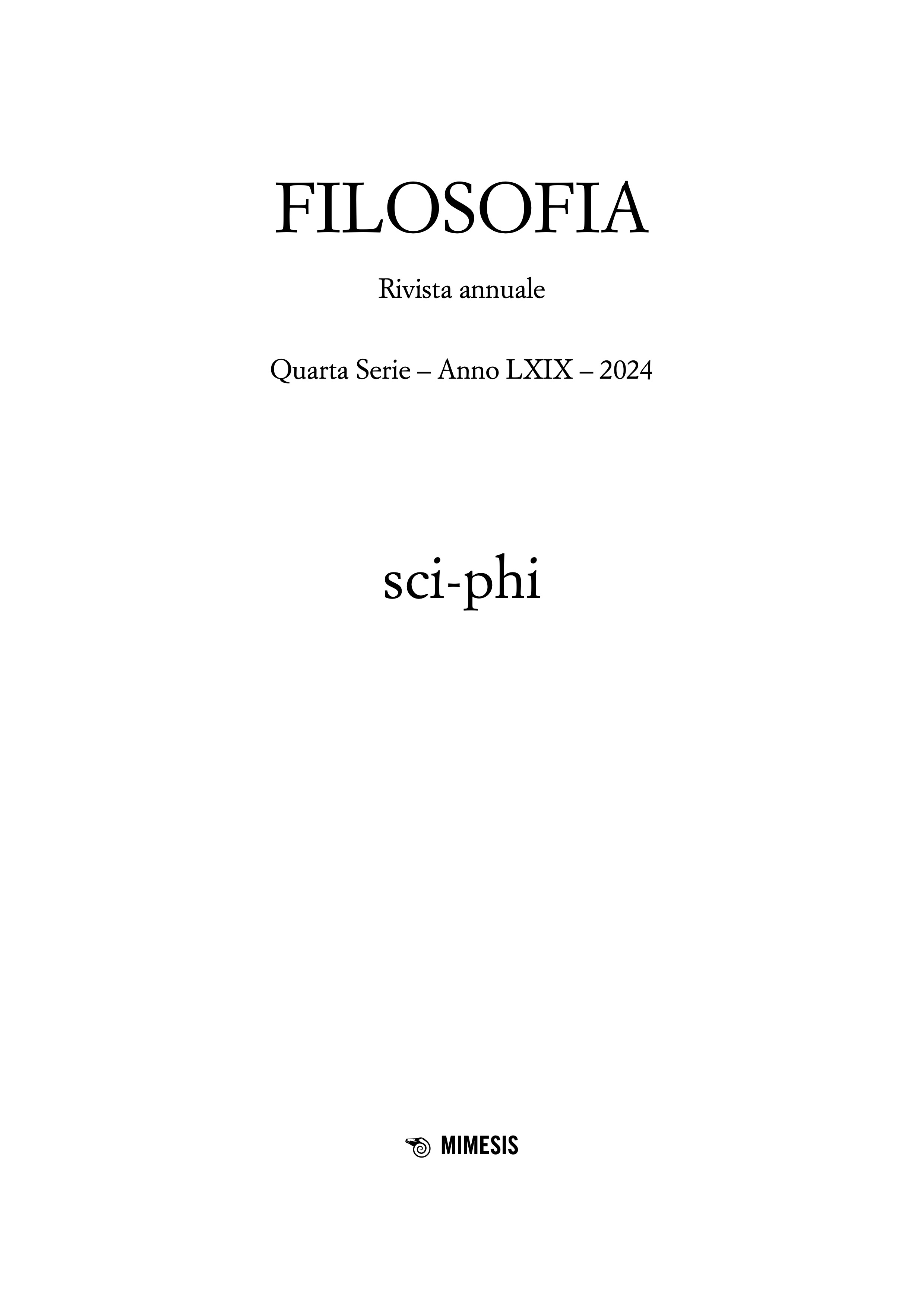Charting Problems through Stories and Science Fiction
DOI:
https://doi.org/10.13135/2704-8195/11204Parole chiave:
Cognitivism, Mental Time Travel, Possible Worlds, Science FictionAbstract
When scholars tackle the theorical problems presented by fiction and stories, they usually do so either from a philosophical standpoint or from a narratological one. This normally results in a partial or incomplete analysis. In this paper the two perspectives will be combined to achieve a theoretical account of how fiction can help to explore and chart problems in a narrative framework, getting in touch with them before moving to a more structured analysis in more specialized fields. To this end, I will analyse the genre of Science Fiction, which, thanks to its peculiar combination of scientific material with fictional one, will be the perfect case study. This line of research will show how fiction and non-fiction can be used concurrently to better understand the theorical challenges scholars can face in their work.
Downloads
Riferimenti bibliografici
Addis, Donna Rose. 2020. ‘Mental Time Travel? A Neurocognitive Model of Event Simulation’. Review of Philosophy and Psychology 11, 233-259.
Atwood, Margaret. 2022. Burning Questions. Essays and Occasional Pieces (2004 to 2021). New York: Doubleday.
Booker, Christopher. 2004. The Seven Basic Plots. Why we tell stories. London: Continuum.
Bradbury, Ray. 2019. Chroniques Martiennes. Paris: Denoël.
Campbell, Joseph. 2020. The Hero with a Thousand Faces. Joseph Campbell Foundation. Stillpoint Digital Press.
Carnap, Rudolf. 1950. ‘Empiricism, Semantics and Ontology’. Revue Internationale de Philosophie 4, n. 11, 20-40.
Eco, Umberto. 1997. ‘Dire il contrario’. In: Menzogna e Simulazione, edited by Massimo Bonfantini, 33-43. Napoli: Edizioni Scientifiche Italiane.
———. 2020. Lector in Fabula. La cooperazione interpretativa nei testi narrativi. Milano: La Nave di Teseo.
Feynman, Richard. 1963. Six not-so-easy pieces. New York: Basic Books.
Gibson, John. 2008. ‘Cognitivism and the Arts’. Philosophy Compass 3/4, 573-589.
Gottschall, Jonathan. 2012. The Storytelling Animal. How Stories Make Us Human. New York: Mariner Books.
Hartl, Richard & Mehlmann, Alexander. 1982. “The Transylvanian Problem of Renewable Resources”. RAIRO Recherche Opérationnelle Vol. 16, No. 4, pp. 379-390.
Hawking, Stephen. 2001. The Universe in a Nutshell. London: Bentam Press.
Ingarden, Roman. 1973. The Literary Work of Art. Translated by George G. Grabowicz. Evanston: Northwestern University Press.
Kripke, Saul. 1980. Naming and Necessity. Cambridge: Harvard University Press.
Lakoff, George, Johnson, Mark. 1980. Metaphors We Live By. Chicago: University of Chicago Press.
LaPlante, Alice. 2007. The Making of a Story. New York-London: Norton & Company.
Lewis, David. 1973. Counterfactuals. Oxford: Blackwell.
———. 1976. ‘The Paradoxes of Time Travel’. American Philosophical Quarterly 13, n. 2, 145-152.
———. 1978. ‘Truth in Fiction’. American Philosophical Quarterly 15, n. 1, 37-46.
———. 1986. On the Plurality of Worlds. Oxford: Blackwell.
McKee, Robert. 1997. Story. Substance, Structure, Style, and the Principles of Screenwriting. New York: Harper Collins.
Nickerson, Raymond. 1998. ‘Confirmation Bias: A Ubiquitous Phenomenon in Many Guises’. Review of General Psychology 2, n. 2, 175 220.
Pievani, Telmo. 2023. ‘La Scienza di Calvino e Borges’. Doppiozero, November 3, 2023. https://www.doppiozero.com/la-scienza-di-calvino-e-borges
Poma, Andrea. ‘La consulenza filosofica’. Kykéion 8, 37-54.
Thorne, Kip. 2014. The science of Interstellar. New York-London: Norton & Company.
Umbrello, Steven, Balistreri, Maurizio. 2023. ‘Human Enhancement and Reproductive Ethics on Generation Ships’. ARGUMENTA 2023, 1-15.
Vogler, Christopher. 2007. The Writer’s Journey. Mythic Structure for Writers. Los Angeles: Michael Wiese Productions.
Yablo, Stephen. 1993. “Is Conceivability a Guide to Possibility?”. Philosophy and
Phenomenological Research Vol. 53, No. 1, 1-42.
———. 2002. “Coulda, Woulda, Shoulda”. In: Conceivability and Possibility, edited by Tamar Szabó Gendler & John Hawthorne, pp. 441-492. Oxford: Oxford University Press.
FILMOGRAPHY
Doctor Who. 2008. Season 4, Episode 1, ‘Partners in Crime’. Directed by James Strong. BBC.
Futurama. 2001. Season 3, Episode 19, ‘Roswell That Ends Well. Directed by Rich Moore. Fox. Broadcasting Company.
Lucas, George (director). 1977. Star Wars: Episode IV – A New Hope. 20th Century Fox.
Zemeckis, Robert (director). 1895. Back to the Future. Universal Pictures.
OTHER WORKS CITED
Collins, Suzanne. 2012. The Hunger Games Trilogy. Wilkinsburg: Scholastic.
Doyle, Arthur Conan. 1981. The Penguin Complete Sherlock Holmes. London: Penguin Books.
Heinlein, Robert Anson. 1959. ‘By his bootstraps’. In: The Menace from Earth. New York: Hicksville.
———. 1959. ‘–All you zombies–’. In: The Unpleasant Profession of Johnathan Haag. New York: Hicksville.
Kling, Marc-Uwe. 2020. Qualityland. New York: Grand Central Publishing.
Kuang, Rebecca F. 2022. Babel: Or the Necessity of Violence: An Arcane History of the Oxford Translators’ Revolution. New York: Harper Collins.
Labatut, Benjamín. 2023. The MANIAC. London: Penguin Press.
Lovecraft, Howard Philips. 1999. The Call of Cthulhu and Other Weird Stories. London: Penguin Books.
Miles, Terry. 2021. Rabbits: A Novel. New York: Random House Worlds.
Roberts, Adam (editor). 2014. Biographia Literaria, by Samuel Taylor Coleridge. Edimburgh: Edimburgh University Press.
Rowling, Joanne. 1998. Harry Potter and the Philosopher’s Stone. London: Bloomsbury Publishing.
##submission.downloads##
Pubblicato
Come citare
Fascicolo
Sezione
Licenza
Copyright (c) 2024 Riccardo Marzullo

TQuesto lavoro è fornito con la licenza Creative Commons Attribuzione 4.0 Internazionale.
Filosofia applica una licenza Creative Commons Attribution 4.0 International License a tutto il materiale pubblicato.



